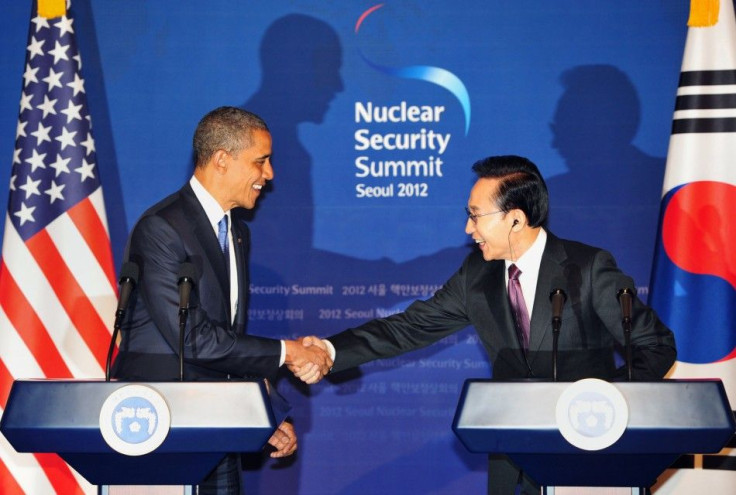Obama Warns North Korea Against Rocket Launch

President Barack Obama, visiting South Korea, called on the Communist North Sunday to call off a planned rocket launch, and warned that food aid in return for disarmament would be at risk.
Bad behavior will not be rewarded, Obama said after meeting with South Korean President Lee Myung-bak on the eve of a summit in Seoul on nuclear security, the Guardian reported. There had been a pattern, I think, for decades, in which North Korea thought if they had acted provocatively, then somehow they would be bribed into ceasing and desisting acting provocatively.
The president also urged China to restrain its neighbor and hinted at further sanctions if Pyongyang goes ahead with the launch next month, Reuters reported. Seoul and Washington say the launch is a disguised test of ballistic missile. North Korea says it merely wants to put a satellite into orbit.
What I've said to [China] consistently is rewarding bad behavior, turning a blind eye to deliberate provocations, trying to paper over these not just provocative words but extraordinarily provocative acts that violate international norms, that that's not obviously working, he said.
I believe that China is very sincere that it does not want to see North Korea with a nuclear weapon, the president told a news conference in Seoul. But it is going to have to act on that interest in a sustained way.
Obama added that he would raise the matter at a meeting with Chinese President Hu Jintao during the summit on Monday.
Obama's comments were his strongest push yet to get China to use its influence to rein in its ally North Korea and dovetails with recent calls for Beijing to meet its responsibilities as a rising world power.
In an election year when Republicans have accused Obama of not being strong enough with Beijing, talking tough on China is seen as a vote-winner after three years of troubled diplomacy in dealing with Afghanistan, Iraq and Iran.
China is host to the six-party talks which also involve the two Koreas, the United States, Japan and Russia.
Earlier in the day, Obama visited a U.S. base on the edge of the Demilitarized Zone as a solemn North Korea came to a halt to mark the 100th day after dear leader Kim Jong-il's death.
You guys are at freedom's frontier, Obama, wearing an Air Force One bomber jacket, told about 50 troops crammed into the Camp Bonifas mess at one of the world's most heavily fortified frontiers.
The contrast between South Korea and North Korea could not be clearer, could not be starker, both in terms of freedom and in terms of prosperity.
He later said of the DMZ: It's like you're in a time warp. It's like you're looking across 50 years into a country that has missed 40 years or 50 years of progress.
The president spent about 10 minutes on a camouflaged viewing platform at the DMZ, talking with some of the soldiers on guard as the flags of the United States, South Korea and the United Nations flapped loudly in the brisk, cold wind.
The White House cast Obama's first visit to the DMZ, which has bisected the peninsula since the end of the Korean War in 1953, as a way to showcase the strength of the U.S.-South Korean alliance and thank some of the nearly 30,000 American troops still deployed in South Korea.
Washington has condemned next month's planned rocket launch as a violation of North Korea's promise to halt long-range missile launches, nuclear tests and uranium enrichment in return for food aid. Obama said that if the North goes ahead with the rocket launch, a February food aid deal could fall apart.
South Korea's Yonhap news agency quoted a military official on Sunday as saying the main body of the rocket had been moved to the launch site on North Korea's west coast. The launch is to coincide with big celebrations marking the 100th anniversary of the birth of the state's founder, Kim Il-sung.
North Korea says it has the right to launch what it describes as an observation satellite, and accused the international community of hypocrisy. If there are any sinister attempts to deprive the Democratic People's Republic of Korea of its independent and legitimate right and impose unreasonable double standards, this will inevitably compel us to take countermeasures, the Foreign Ministry said in a statement.
North Korea's defiance is clouding Obama's nuclear disarmament agenda, which is also being challenged by Iran's continued nuclear developments in the face of sanctions and international criticism.
Obama said the window of opportunity for diplomacy with Iran was still open, and he also discussed the Syrian crisis with Turkish Prime Minister Tayyip Erdogan.
Obama will join more than 50 other world leaders in Seoul Monday for a follow-up to the inaugural nuclear security summit he organized in Washington in 2010 to help combat the threat of nuclear terrorism.
While North Korea and Iran are not on the guest list or the official agenda, they are expected to be the main focus of Obama's array of bilateral meetings on the sidelines of the two-day summit.
Obama's visit coincided with the end of the 100-day mourning period for the North's long-time leader, Kim Jong-il, who died in December. Tens of thousands of people crammed into Kim Il-sung Square in central Pyongyang to mark the occasion.
The state's new young leader, Kim Jong-un, the third member of the Kim family to rule the state, bowed before a portrait of his father at the palace where he lies in state. He was joined by his uncle, Jang Song-thaek, and military chief Ri Yong-ho.





















